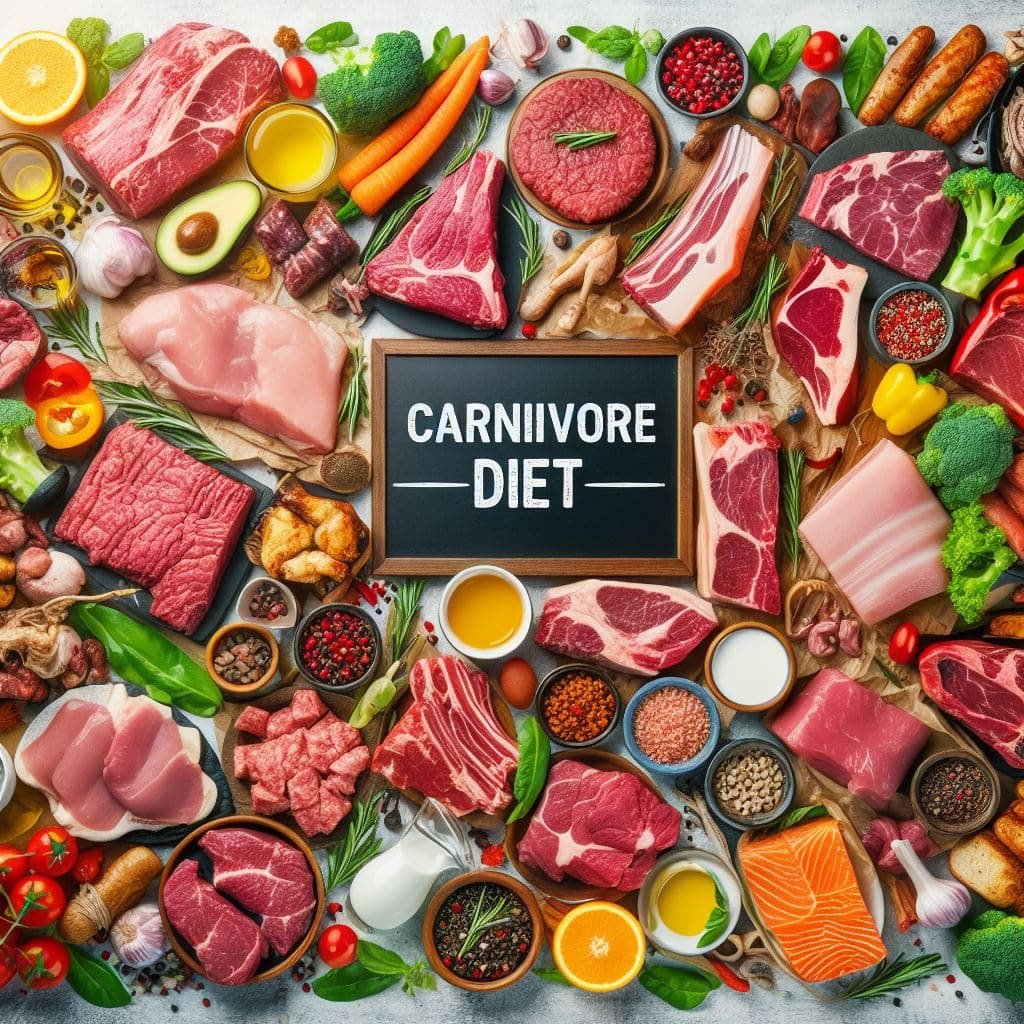
Delve into the realm of carnivorous abundance, where every cut of meat becomes a canvas for culinary exploration and every bite a testament to the power of simplicity. From succulent steaks to sizzling sausages, the Carnivore Diet Food List offers a cornucopia of options to tantalize the taste buds and nourish the body. But beyond mere sustenance, it beckons us to embrace a lifestyle rooted in tradition and reverence for the natural world.
Table of Contents
What is the Carnivore Diet?
The carnivore diet, also known as the zero-carb diet or all-meat diet, is a dietary approach that emphasizes the consumption of animal products while excluding all plant-based foods. Advocates of this diet believe that humans evolved as carnivores and that consuming only animal products can lead to various health benefits.
This diet is rooted in the belief that eliminating carbohydrates and plant foods from the diet can improve overall health, promote weight loss, and alleviate certain health conditions. It is often considered an extreme form of the ketogenic diet, as it drastically reduces carbohydrate intake and relies primarily on fats and proteins for energy.
Proponents of the carnivore diet claim that it can lead to weight loss, increased energy levels, improved mental clarity, and better digestion. However, critics argue that eliminating entire food groups, such as fruits, vegetables, and grains, can lead to nutritional deficiencies and potential health risks in the long term.
Benefits of the Carnivore Diet
- Weight Loss: By eliminating carbohydrates and processed foods, the carnivore diet may lead to rapid weight loss for some individuals. Without the presence of carbohydrates, the body is forced to burn stored fat for energy, resulting in weight loss over time.
- Improved Mental Clarity: Supporters of the carnivore diet often report experiencing increased mental clarity and focus. By eliminating foods that may cause inflammation or disrupt brain function, such as grains and sugars, individuals may experience improved cognitive function and mental well-being.
- Reduced Inflammation: Certain plant foods contain compounds known as lectins and phytates, which may contribute to inflammation in the body. By eliminating these foods from the diet, individuals following the carnivore diet may experience reduced inflammation and related symptoms, such as joint pain and bloating.
- Simplified Meal Planning: Unlike other diets that require careful tracking of macronutrients and meal planning, the carnivore diet is relatively simple to follow. With a focus on animal products such as meat, fish, and eggs, meal preparation can be straightforward and convenient.
- Potential Health Benefits: While more research is needed to fully understand the long-term effects of the carnivore diet, some studies suggest that it may have potential health benefits, such as improved blood sugar control, reduced risk of certain diseases, and better overall health markers.
Carnivore Diet Food List
Foods to Eat on Carnivore Diet
- Red Meat: Beef, lamb, and pork are staples of the carnivore diet, providing essential nutrients such as protein, iron, and B vitamins.
- Poultry: Chicken, turkey, and duck are also suitable options for those following the carnivore diet, offering lean protein and various vitamins and minerals.
- Fish and Seafood: Salmon, tuna, shrimp, and other seafood are rich sources of protein and omega-3 fatty acids, making them ideal choices for carnivore dieters.
- Eggs: Whole eggs are highly nutritious and versatile, providing essential nutrients such as protein, vitamins, and minerals.
- Organ Meats: Liver, heart, and other organ meats are nutrient-dense foods that provide essential vitamins and minerals, including vitamin A, vitamin B12, and iron.
Foods to Avoid on Carnivore Diet
- Fruits and Vegetables: All fruits and vegetables are excluded from the carnivore diet, as it emphasizes the consumption of animal products exclusively.
- Grains: Grains such as wheat, rice, oats, and barley are not allowed on the carnivore diet, as they are considered sources of carbohydrates.
- Legumes: Beans, lentils, and other legumes are restricted on the carnivore diet due to their carbohydrate content and potential to cause digestive issues.
- Processed Foods: Processed foods such as chips, cookies, and candy are not permitted on the carnivore diet, as they typically contain added sugars and other non-compliant ingredients.
Carnivore Diet Shopping List
- Fresh Meat: Stock up on a variety of fresh meats, including beef, pork, lamb, chicken, and turkey.
- Fish and Seafood: Choose fatty fish such as salmon and mackerel, as well as shellfish like shrimp and crab.
- Eggs: Purchase pasture-raised or organic eggs whenever possible for the highest quality and nutritional value.
- Organ Meats: Include nutrient-rich organ meats such as liver, heart, and kidney in your shopping list to ensure optimal nutrient intake.
- Dairy Products: While dairy is not strictly prohibited on the carnivore diet, some individuals may choose to include high-fat dairy products such as cheese and butter.
Carnivore Diet Meal Plan
Day 1:
- Breakfast: Scrambled eggs with bacon
- Lunch: Grilled steak with butter
- Dinner: Baked salmon with a side of liver pâté
Day 2:
- Breakfast: Sausage links with fried eggs
- Lunch: Chicken thighs roasted in duck fat
- Dinner: Ground beef cooked in bone broth with cheese topping
Day 3:
- Breakfast: Ribeye steak with eggs over easy
- Lunch: Pork chops with a side of crispy pork rinds
- Dinner: Grilled lamb chops with garlic butter
Day 4:
- Breakfast: Duck eggs with bacon strips
- Lunch: Tuna salad made with mayonnaise and diced pickles
- Dinner: Beef liver sautéed in butter with onions
Day 5:
- Breakfast: Turkey bacon with scrambled eggs
- Lunch: Pan-seared shrimp with melted butter
- Dinner: Beef ribs slow-cooked in bone broth
Day 6:
- Breakfast: Omelette filled with diced ham and shredded cheese
- Lunch: Grilled chicken thighs seasoned with herbs and spices
- Dinner: Seared scallops served with a side of hollandaise sauce
Day 7:
- Breakfast: Smoked salmon slices with cream cheese spread on cucumber rounds
- Lunch: Beef brisket slow-cooked until tender and juicy
- Dinner: Roast duck with crispy skin and tender meat
Planning your meals on the carnivore diet can be relatively straightforward, focusing primarily on animal-based foods while avoiding plant-based options. It’s essential to prioritize high-quality, nutrient-dense foods to ensure you’re meeting your body’s nutritional needs.
As with any diet, it’s essential to listen to your body and make adjustments as needed. Some individuals may thrive on the carnivore diet, experiencing increased energy levels, improved mental clarity, and better overall health. However, others may find it challenging to sustain over the long term or may experience adverse effects.
Before starting any new diet, it’s always a good idea to consult with a healthcare professional or registered dietitian to ensure it’s appropriate for your individual needs and goals. They can provide personalized guidance and support to help you achieve your health and wellness objectives while following the carnivore diet or any other dietary approach.
Carnivore Diet Food List (FAQs)
Q: Can I drink coffee on the Carnivore Diet?
A: While some people choose to include coffee in their Carnivore Diet, others prefer to avoid it due to its potential effects on gut health and digestion. It ultimately depends on individual tolerance and preferences.
Q: Is the Carnivore Diet safe for long-term use?
A: While short-term studies have shown potential benefits of the Carnivore Diet, more research is needed to determine its long-term safety and efficacy. It’s essential to listen to your body and consult with a healthcare professional before making any significant dietary changes.
Q: What about fiber? Don’t we need it for digestive health?
A: While fiber is often touted as essential for digestive health, the need for dietary fiber is hotly debated within the scientific community. Many followers of the Carnivore Diet report improved digestion and gut health despite the absence of dietary fiber.
Q: Can I eat cured meats on the Carnivore Diet?
A: Cured meats like bacon and salami are technically allowed on the Carnivore Diet, but it’s essential to choose high-quality options without added sugars or artificial ingredients.
Q: Will I miss eating fruits and vegetables on the Carnivore Diet?
A: While some people may miss certain foods initially, many Carnivore Diet followers report feeling satisfied and satiated on an all-meat diet. With proper meal planning and preparation, you can enjoy a wide variety of delicious animal-based foods.
Q: How can I get enough vitamins and minerals on the Carnivore Diet?
A: Animal-based foods are rich in essential nutrients like protein, vitamins, and minerals. By prioritizing nutrient-dense foods like organ meats and fatty fish, you can ensure you’re meeting your body’s needs on the Carnivore Diet.



